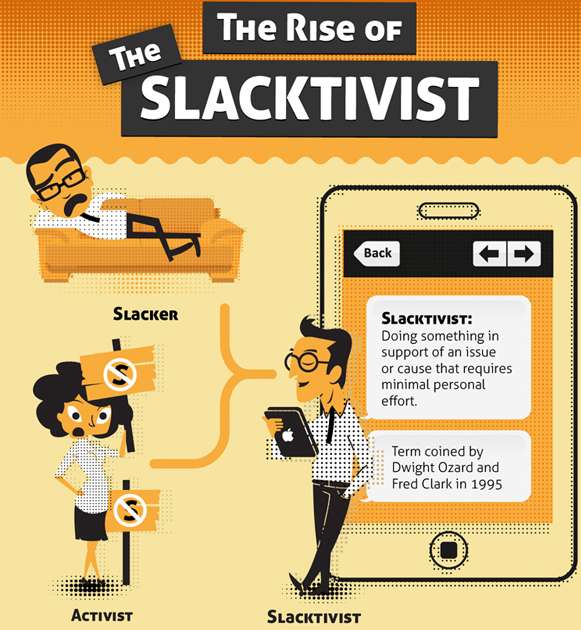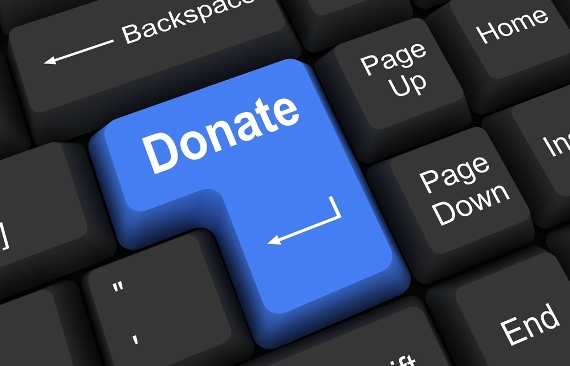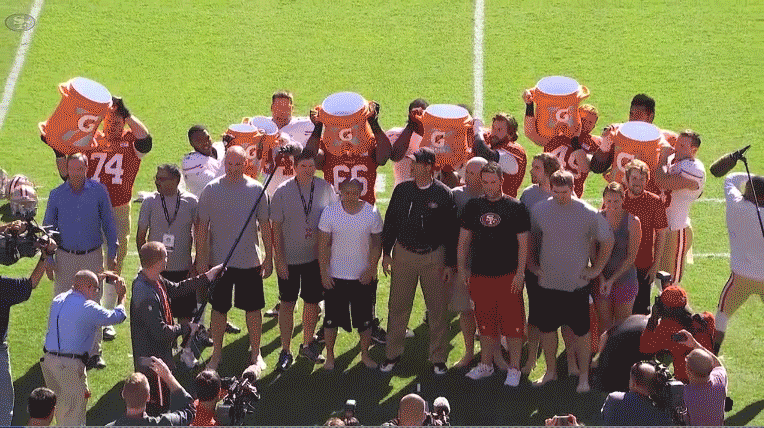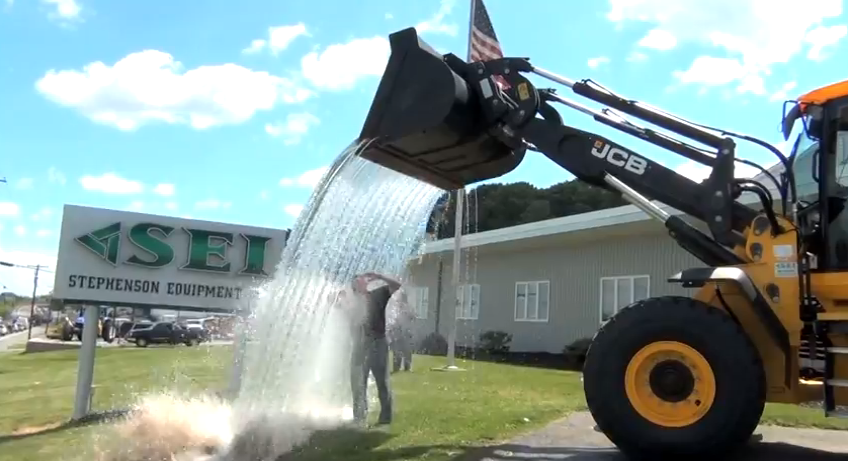Should I Be Doing The ALS Ice Bucket Challenge Too?
It looks like 'everyone' is doing the ALS Ice Bucket Challenge. Would you do it? Should you? Here's everything you need to know to help you decide.
The Ice Bucket Challenge is a challenge to raise awareness on ALS and of course, funds
Chris Pratt, Oprah Winfrey and Justin Bieber complete the ALS Ice Bucket Challenge
Image via novafm.com.auThe challenge involves people getting doused with buckets of ice water on video, posting that video to social media, then nominating others to do the same, all in an effort to raise ALS awareness. Those who refuse to take the challenge are asked to make a donation to the ALS charity of their choice.
So what's with the challenge? Here’s how it works: Grab your camera and fill up a bucket of ice water. (No cheating—make it big!) Tell everyone about the cause and challenge a few friends to take the plunge—if they opt out, they donate $100. Then it’s time to get down to business. After you’ve dried off, post the video on all of your social media accounts with a link to donate. Easy, right?
ALS is a disease that affects a person's ability to control his or her muscles and movement, causing it to degenerate over time. Prominent sufferers include Steven Hawking and Malaysian footballer Mokthar Dahari.
Amyotrophic lateral sclerosis (ALS), often referred to as "Lou Gehrig's Disease," is a progressive neurodegenerative disease that affects nerve cells in the brain and the spinal cord. Motor neurons reach from the brain to the spinal cord and from the spinal cord to the muscles throughout the body. The progressive degeneration of the motor neurons in ALS eventually leads to their death.
alsa.orgAmyotrophic lateral sclerosis (ALS) is a neurodegenerative disease with various causes. It is characterised by muscle spasticity, rapidly progressive weakness due to muscle atrophy, difficulty in speaking (dysarthria), swallowing (dysphagia), and breathing (dyspnea). ALS is the most common of the five motor neuron diseases.
There is no cure currently in the market. Only a few drugs and therapy can improve a patient's quality of life.
There is no cure currently in the market. Only a few drugs and therapy can improve a patient's quality of life.
Image via hdnux.comWhile there is not a cure or treatment today that halts or reverses ALS, there is one FDA approved drug, riluzole, that modestly slows the progression of ALS as well as several other drugs in clinical trials that hold promise.
alsa.orgImportantly, there are significant devices and therapies that can manage the symptoms of ALS that help people maintain as much independence as possible and prolong survival.
alsa.orgRiluzole (Rilutek) is the only treatment that has been found to improve survival but only to a modest extent. It lengthens survival by several months, and may have a greater survival benefit for those with a bulbar onset. It also extends the time before a person needs ventilation support. Riluzole does not reverse the damage already done to motor neurons, and people taking it must be monitored for liver damage (occurring in ~10% of people taking the drug). It is approved by Food and Drug Administration (FDA) and recommended by the National Institute for Clinical Excellence (NICE). Other treatments for ALS are designed to relieve symptoms and improve the quality of life for patients. This supportive care is best provided by multidisciplinary teams of health care professionals working with patients and caregivers to keep patients as mobile and comfortable as possible.
Thanks to the Ice Bucket Challenge, the ALS Association in the US has seen a huge spike in donations, receiving about USD 12 million more compared to 2013
Thanks to the Ice Bucket Challenge, the ALS organisation has seen a huge spike in donations, receiving at least 12 million dollars more than last year.
Image via dailymail.co.ukDonations to the ALS Association have spiked. As of Sunday, the association said it had received $13.3 million in donations since July 29, compared with $1.7 million during the same period last year. It said there were about 260,000 new donors. (With a spate of celebrities and business executives joining in over the past few days and pledging contributions, that number is expected to rise.)
"Alright, I've seen some of my friends share articles about this challenge stating that it is just a fad and a cause for 'slacktivism.' What is that about? Is this something like Kony 2012?"
Slacktivism is a feel-good effect, normally in support of a social cause which requires minimal effort. Some critics are saying that it's better to just donate and not do the challenge.
Slacktivism is a feel-good effect, normally in support of a social cause which requires minimal effort.
Image via trendhunterstatic.comSlacktivism (sometimes slactivism or slackervism) is a portmanteau of the words slacker and activism. The word is usually considered a pejorative term that describes "feel-good" measures, in support of an issue or social cause, that have little or no practical effect other than to make the person doing it take satisfaction from the feeling they have contributed. The acts tend to require minimal personal effort from the slacktivist.
We might, instead of normalizing the actual effective giving of grants and donations, normalize slacktivism. It could easily turn out that we start to emotionally associate a click or a like or a mention as an actual form of causing change, not merely a way of amplifying a message that might lead to that action happening.
typepad.comThere has been a backlash. Some have criticized the campaign for so-called slacktivism, where people will click and post online for social causes with little actual impact on the cause. “There are a lot of things wrong with the Ice Bucket Challenge, but the most annoying is that it’s basically narcissism masked as altruism,” said Arielle Pardes, a writer for Vice. On Slate, Will Oremus urged people to take the “no ice bucket challenge” and just donate the money.
The explanation behind moral licensing is that people are often more concerned about looking good or feeling good rather than doing good. If you “do your bit” by buying an energy-efficient lightbulb, then your status as a good human being is less likely to be called into question if you subsequently steal.
"We could have 6 billion people dump ice over their head and it wouldn't change the brutal and silent death over 100,000 [people] worldwide will experience in the next 12 months," he said. "So in addition to dumping ice on your head: step up; donate; get involved; care for a patient. That's it."
Some suggested that due to the mass drive of donations, people are less likely to donate to other organisations due to the "I've done my part" mentality
Some suggested that due to the mass drive of donations, people are less likely to donate to other organisations due to the "I've done my part" mentality.
Image via wordpress.comThe key problem is funding cannibalism. That $3 million in donations doesn’t appear out of a vacuum. Because people on average are limited in how much they’re willing to donate to good causes, if someone donates $100 to the ALS Association, he or she will likely donate less to other charities.
This isn’t just speculation. Research from my own non-profit, which raises money for the most effective global poverty charities, has found that, for every $1 we raise, 50¢ would have been donated anyway. Given our fundraising model, which asks for commitments much larger than the amount people typically donate, we have reason to think that this is a lower proportion than is typical for fundraising drives. So, because of the $3 million that the ALS Association has received, I’d bet that much more than $1.5 million has been lost by other charities.
Ice Bucket defenders would argue this is all just meant to “raise awareness,” meaning those who participate are still doing good without donating. ALS needs all the awareness it can get, but somehow I doubt many learned a whole lot from contextless tweets of wet celebs smiling and laughing.
Yes, no one can deny that the ALS Ice Bucket Challenge has raised awareness. Many have defended the movement, pointing to the success of the amount of money raised.
They've spread the word. The fact is that most charities have no chance at all to reach the typical citizen, and if their fundraising strategy is small donations from many people, this message barrier is a real issue. Peer-to-peer messaging, even if largely ego-driven, is far better than nothing. In a sideways media world, the only way to reach big numbers is for a large number of people to click a few times, probably in response to a request from a friend.
typepad.comIt's a serious issue in our sector, this criticism of hashtag activism, and it needs to stop. What the ice bucket challenge is showing us is just what slacktivism/clicktivism can accomplish. When designed and harnessed correctly, these types of social media campaigns are exactly how awareness is created.
"But when it costs you NOTHING, isn't it worth trying when you have a model like this to follow?"
Image via rrcdn.comSo what is behind all the negativity surrounding this challenge? Is it jealousy or sour grapes because our organizations aren't reaping the same benefits as the ALS Association? Hopefully we're better than that. But then why aren't we thrilled at the potential we're seeing unfold this season?
Engagement is a living entity. Your movement may start with a simple retweet, but guided by the hands of a savvy nonprofit marketing or engagement specialist, each small next step helps to cultivate clicktivists for your cause. Will those clicktivists produce an 800 percent increase in tangible donations? Maybe, maybe not. But when it costs you NOTHING, isn't it worth trying when you have a model like this to follow?
Okay, I know what the disease does now, and perspectives from both sides regarding the Ice Bucket Challenge. So, should I be doing the challenge? Or should I just donate?"
If you feel strongly about the cause, donate and participate by all means. However, there are many different charities out there - research, find a charity that is close to your heart, and support them
If in donating to charity you don’t conceive of it as “doing your bit” but instead as taking one small step towards making altruism a part of your identity, then one good deed really will beget another. This means that we should tie new altruistic commitments to serious, long-lasting behavior change. Rather than making a small donation to a charity you’ve barely heard of, you could make a commitment to find out which charities are most cost-effective, and to set up an ongoing commitment to those charities that you conclude do the most good with your donations. Or you could publicly pledge to give a proportion of your income.
Remember, no matter what we do and how well we do it, there will always be those who will find fault. But if we listen to every criticism we'll stop ourselves from taking risks and seeking innovation, and that is not the kind of society we want to become. If we instead spend our energy looking for solutions, I guarantee we'll find our own versions of the ice bucket challenge and its subsequent success.
I think the goal needs to be that activism and action are not merely the right thing to do, but the expected, normal thing to do.
typepad.comThe memes we create, join, and perpetuate are the ones which will determine the cultural norms of the future i.e. what is ‘ok’ and what is not ‘ok’, which is why I’ve chose not to put people over a barrel, well, under an icy cold bucket. My final words are this: Donate to charity. A charity to which you relate.









